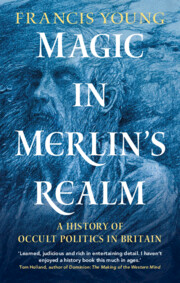Book contents
- Magic in Merlin’s Realm
- Reviews
- Frontispiece
- Magic in Merlin’s Realm
- Copyright page
- Dedication
- Contents
- Plates
- Preface
- Introduction
- 1 ‘Britain Indulges in Magic’
- 2 The Secrets of the King
- 3 Arthurian Dynasty
- 4 House of the Unicorn
- 5 Politics and the Decline of Magic, 1649–1714
- 6 Emanations of Albion
- Conclusion
- Bibliography
- Index
- Plate Section (PDF Only)
3 - Arthurian Dynasty
The Tudors and Occult Power
Published online by Cambridge University Press: 07 February 2022
- Magic in Merlin’s Realm
- Reviews
- Frontispiece
- Magic in Merlin’s Realm
- Copyright page
- Dedication
- Contents
- Plates
- Preface
- Introduction
- 1 ‘Britain Indulges in Magic’
- 2 The Secrets of the King
- 3 Arthurian Dynasty
- 4 House of the Unicorn
- 5 Politics and the Decline of Magic, 1649–1714
- 6 Emanations of Albion
- Conclusion
- Bibliography
- Index
- Plate Section (PDF Only)
Summary
The Tudors’ Welsh ancestry and doubtful claim to the English throne rendered them conscious successors of King Arthur, and the mythology surrounding Arthur and Merlin became central to the construction of Tudor power from 1485 onwards. Accusations and rumours of magic were rife at the court of Henry VIII and played a key role in the downfall of Anne Boleyn as queen, but allegations of magic also swirled around Cardinal Wolsey in Henry’s early reign. However, it was not until the reign of Elizabeth that a Tudor monarch embraced her ‘Arthurian’ identity to the extent of seeking the advice of a latter-day Merlin, a role eagerly fulfilled by John Dee. At the high point of Dee’s influence a magically inspired idea of a British empire briefly influenced official policy under a queen so fascinated by the occult arts that she personally practised alchemy. At the same time, the Italian religious exile (and possible spy) Giordano Bruno saw himself as an ‘occult missionary’, bringing his particular brand of Hermetic magic to England.
- Type
- Chapter
- Information
- Magic in Merlin's RealmA History of Occult Politics in Britain, pp. 138 - 189Publisher: Cambridge University PressPrint publication year: 2022



